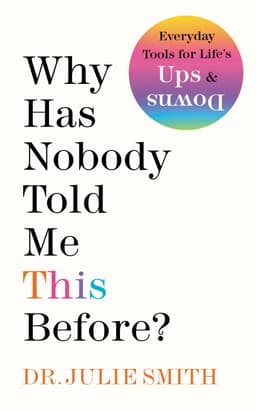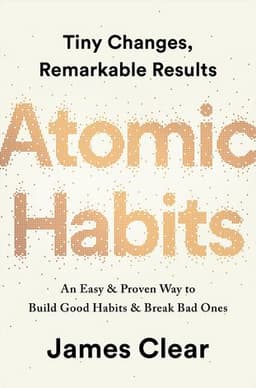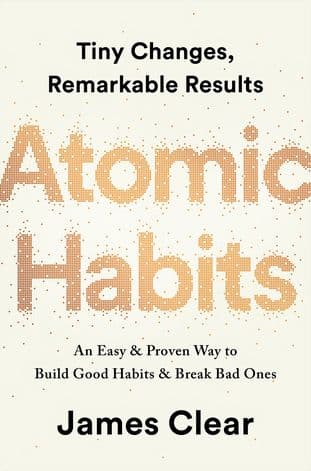
Why Has Nobody Told Me This Before Book Summary
Book by Julie Smith
Want to read the full summary?Click here to read for free!
Summary
In "Why Has Nobody Told Me This Before?", Dr. Julie Smith shares practical insights and tools from therapy to help you navigate life's challenges, build resilience, and create a meaningful life aligned with your values.
Sign in to rate
Average Rating: 3
These are the best quotes from Why Has Nobody Told Me This Before? by Julie Smith. If you want to read a full summary of this book for free, click here.
Your Brain Is Constantly Working To Make Sense
"Your brain is constantly working to make sense of what is going on. But it only has a certain number of clues to work from. It takes information from your body (e.g. heart rate, breathing, blood pressure, hormones). It takes information from each of your senses – what you can see, hear, touch, taste and smell. It takes information from your actions and thoughts. It pieces all these clues together with memories of when you have felt similar in the past and makes a suggestion, a best guess about what is happening and what you do about it."
Section: 1, Chapter: 1
On Journaling
"The aim is to build on your ability to reflect on your experiences and how you responded to them...Metacognition involves reflecting on those thoughts and how they further impacted on your experience...Journaling in this way can feel strange if we are used to glossing over things without paying too much attention to the details. But over time those details can help us to build our awareness of our experience in hindsight, as we start to spot the cycles and patterns of behaviour in the moment, as they happen."
Section: 2, Chapter: 9
Emotions Are Neither Enemy Nor Friend
"Emotions are neither your enemy nor your friend. They do not occur because your brain has a few cogs misaligned or because you are a sensitive soul, as you were told in the past. Emotions are your brain's attempt to explain and attach meaning to what is going on in your world and your body. Your brain receives information from your physical senses about the outside world and from your bodily functions, like your heart rate, lungs, hormones and immune function. It then uses memory of these sensations that occurred in the past to make some sense of them now."
Section: 3, Chapter: 10
"To Build Confidence, Go Where You Have None"
"Confident is not the same as comfortable. One of the biggest misconceptions about becoming self-confident is that it means living fearlessly. The key to building confidence is quite the opposite. It means we are willing to let fear be present as we do the things that matter to us.
When we establish some self-confidence in something, it feels good. We want to stay there and hold on to it. But if we only go where we feel confident, then confidence never expands beyond that. If we only do the things we know we can do well, fear of the new and unknown tends to grow. Building confidence inevitably demands that we make friends with vulnerability because it is the only way to be without confidence for a while."
Section: 5, Chapter: 19
Reframing Experiences as Challenges
"Reframing does not mean that you deny the inherent risks in a given situation. There was still a risk of failing my exam. But if I chose to focus exclusively on that risk then my stress response might have been much higher and I probably would have found it much more difficult to perform.
Reframing is when you allow yourself to consider reinterpreting the situation in a way that is going to help you move through it. Reframing an experience as a challenge can help us to shift from the flight urge to a somewhat more controlled fight urge. We can move towards something with intention."
Section: 6, Chapter: 25
Values Are Not The Same As Goals
"Values are not the same as goals. A goal is a concrete, finite thing that you can work towards. Once you achieve it, that is the end point. Then you have to look for the next goal. A goal might be passing an exam, ticking everything off your to do list, or running a personal best.
Values are not a set of actions that can be completed. Values are a set of ideas about how you want to live your life, the kind of person you want to be and the principles you want to stand for."
Section: 8, Chapter: 33
Related Content


Atomic Habits Book Summary
James Clear
Atomic Habits reveals the surprising power of small habits, demonstrating how tiny changes can compound into remarkable results over time. By focusing on systems over goals and building identity-based habits, you can create lasting change and unlock your full potential.
Atomic Habits reveals the surprising power of small habits, demonstrating how tiny changes can compound into remarkable results over time. By focusing on systems over goals and building identity-based habits, you can create lasting change and unlock your full potential.
Productivity
Personal Development
Psychology

